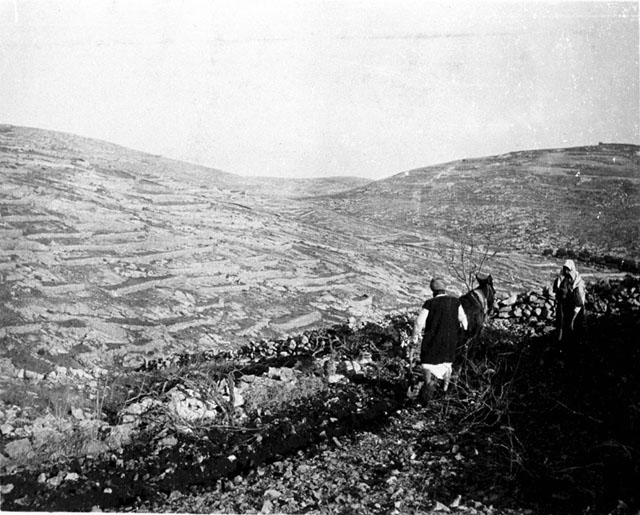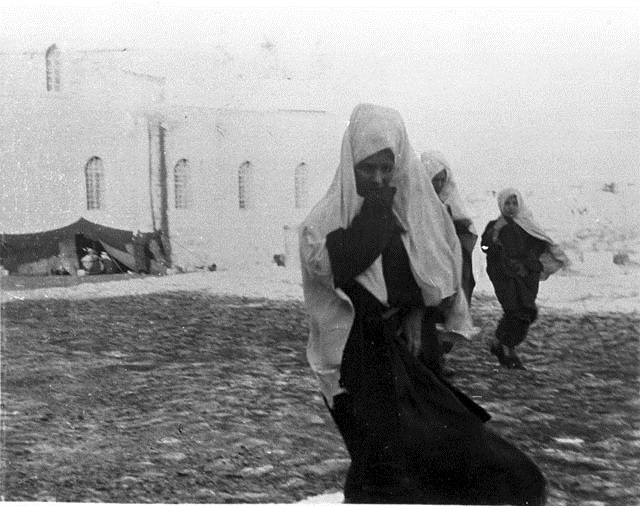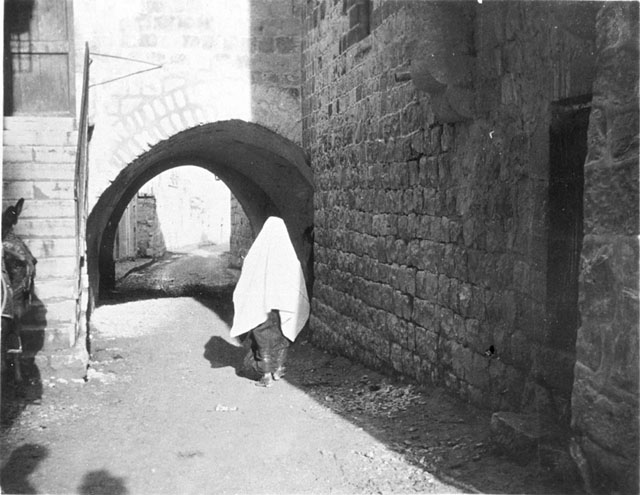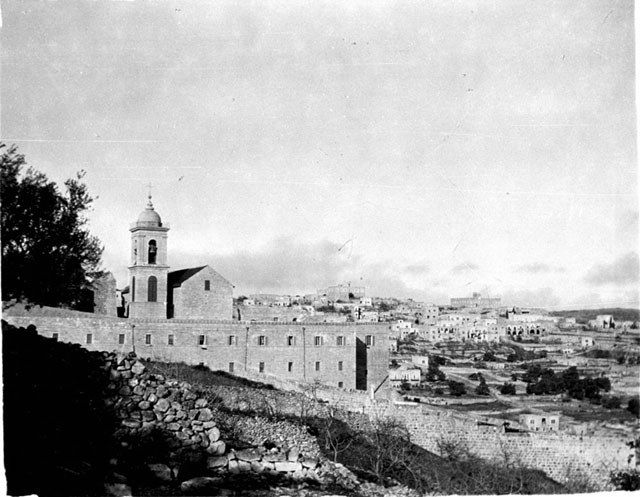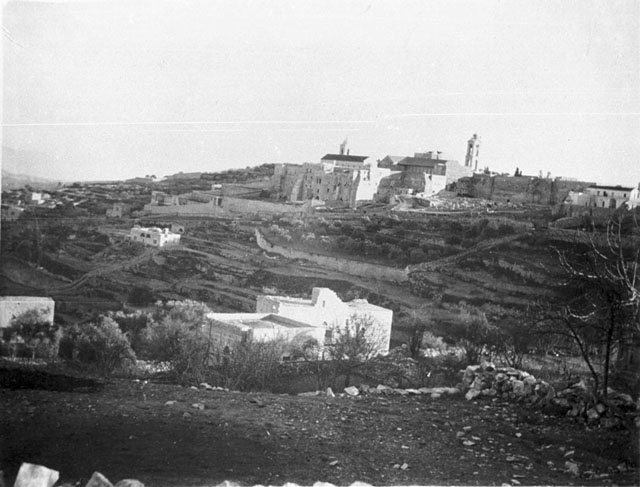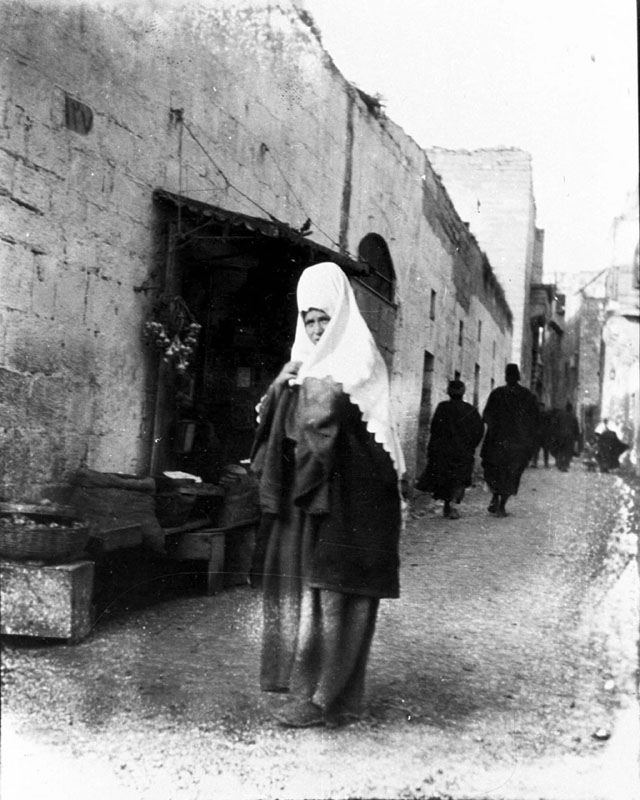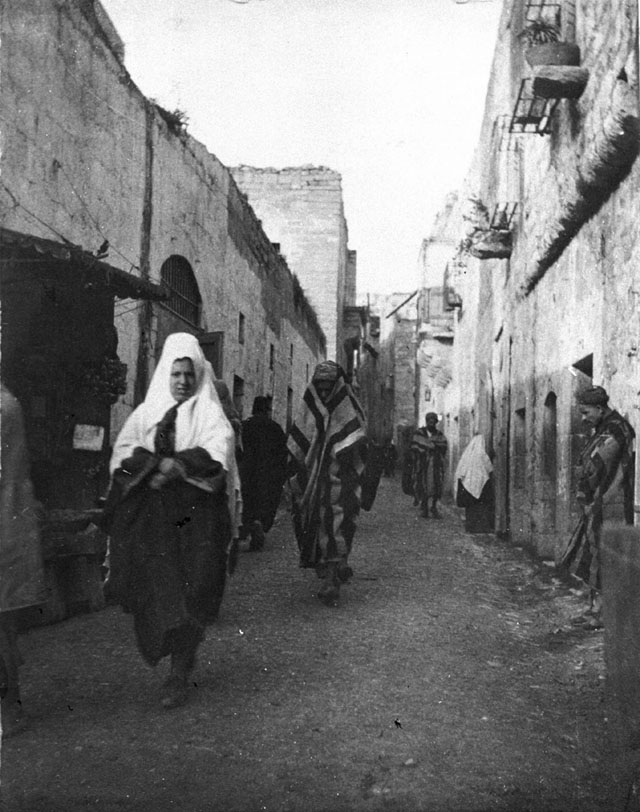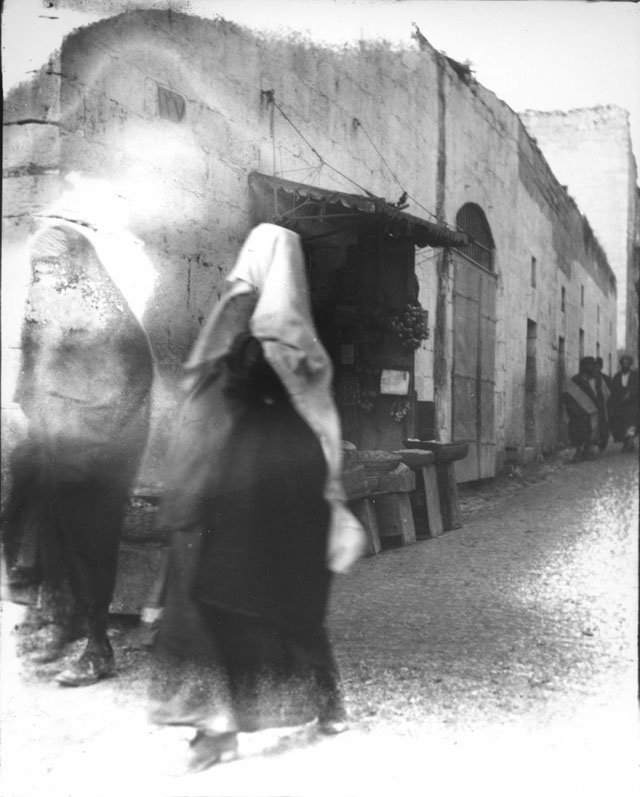“Nina is very busy preparing a Xmas tree and we spend our evenings tying up presents and gilding walnuts”
Privilege doesn't always equate to an easy childhood, and Gertrude Bell's was touched by the great social leveller, death. Her father Hugh Bell was a land-owning Victorian, a wealthy Iron-master from the north of England who was awarded the hereditary title of baronet by Queen Victoria. Gertrude's early years altered inexorably and painfully for her when she was just three and her mother died shortly after childbirth. Her baby brother Maurice survived; and most importantly to her then and over the years, she had her father to depend on - but when she was eight, things changed again. Hugh Bell re-married, and Gertrude had a new mother.
The iconic image of Victoria and Albert celebrating a German Christmas (Creative Commons)
Hugh's second wife, Florence Ollife, was a looming and extraordinary prescence in Gertrude's life. She certainly cared; and she sparkled with intelligence. A playwright, thinker and mover in society, Florence Bell was a crucial influence on all her family. Their Christmases were pleasant, centered around home, and charitable deeds. Prince Albert had brought to Britain in the 1840s the German traditions of Christmas trees and gifts, as well as his own thinking around hearth and home. Additionally, Florence Bell personally knew Charles Dickens, the man who through his popular writings helped to create and spread the construct of the Victorian Christmas.
This post is part of a series of pieces and articles on Gertrude Bell
The Bells were a progressive and complex family - atheists, ardently anti-suffrage, creative, socially conservative. Florence Bell was a Victorian lady who, although she had gradually pushed Gertrude out from family home and into education, was insistent that she were chaperoned whilst visiting people and seeing London and Europe. Florence then encouraged even more travelling and 'useful work' when it became clear that Gertrude was not about to settle to marry anyone 'suitable'. In one of her early visits to the Middle East in late 1899, Gertrude Bell stayed with the Rosens, a German consular family in Jerusalem.
In my previous blog piece on Gertrude Bell, I observed that of the friendships that she had with women, her friendships with Nina Rosen and Nina's older sister Charlotte Roche seem underrated, given how they were influential in a number of ways. Bell's formative years in terms of 'constructing Bell' seem to me to have taken place not as a modern history undergraduate, nor as a 'young lady' in society when she was permanently watched and supervised and 'on duty' socially at all times; I think they began in her late twenties and early thirties, away from England and in the company of vibrant and thoughtful fellow-travellers like Nina and Charlotte.
In that piece I noted in particular how the photographs taken with the Rosen-Roche family at the Dead Sea provide a tangible record of these important and influential friendships. Bell wasn't the only woman moving in a man's world - she learned from other women directly in the Middle east, women like Nina and Charlotte, as well as making up her own rules.
The friendships were to include an overnight Christmas Eve excursion to Bethlehem, where Bell shared a church 'cell' with Nina and her elder sister, Charlotte, after the (very) lengthy midnight mass was complete.
Indeed by Christmas Eve 1899, the festive preparations were already well underway in the Rosen's German household in Jerusalem. Nina, wrote Gertrude, was preparing a Christmas tree for the season. Presents were being wrapped and tied, and walnuts gilded, all while Dr Rosen read aloud to them his travel letters from Persia. Friedreich and Nina Rosen inhabited the somewhat bijou German Consulate in their official capacity, and Bell, whilst officially their guest, was billetting very close by at the roomier (for her) Jerusalem Hotel. Bell spend huge swathes of time with her hosts, including Nina's two young sons, and in her diary entries and letters wrote fondly and excitedly of the family's kindnesses towards her and their family life.
Upon arrival in Jerusalem, for example, after a long sea journey through the Mediterranean from England, she was collected by the Rosens from the port of Jaffa, and then they in turn were met by Charlotte on arrival in Jerusalem. Charlotte took Gertrude on to her rooms at the Jerusalem Hotel and saw her settled.
They are perfect dears, these people. I feel as if I should love them very much indeed. (Letters, 13th December 1899)
It had been a pretty gruelling sea voyage lasting two weeks with many ports of call and the attendant bureaucracy of the Turkish Ottoman Empire once they entered its waters. Bell however had come prepared, bemused rather than fazed by the byzantine currency exchanges. She was also ready to become a photographer - indeed, one of the last calls she made before she left London was to the Photographic Association where she made herself a member (Letters, 25 Nov 1899), and ordered rolls of film. She then went to pay a visit with her Aunt Mary to 'the Arts and Crafts'. She was interested in visual art as well as the written word, and, in her style, prepared herself methodically to be creative. She carried a lot of baggage with her - and not just cutlery and maps. She was packing a serious sense of superiority, along with a broken heart caused (rather bewilderingly) by Henry Cadogan.
Bethlehem - Town Plan (credit: Swan Hellenic Cruise Handbook)
Charlotte, a decade older than Gertrude, was already an accomplished photographer and had studied at the Slade. Despite Bell at one point describing Charlotte to her step-mother as 'unintelligent' - the kind of silly dig that Bell sometimes made when writing to her family, whose approval she craved - she seemed, in reality, to want and need Charlotte's company. They became close friends and spent a lot of time together, sometimes with other Rosen family members, sometimes just the two of them, riding their horses out and about, walking, and photographing sites and people of interest. Bell's compositions improved throughout this first stay in the Middle East (Jan 1899 - June 1900), assisted by Charlotte and enabled by her portable new Kodak camera and its rolls of flexible film.
It was inevitable that the party would visit Bethlehem at some point, and it was decided to tie in the visit with Christmas. Bell, an atheist, was unemotional about the religious aspects but interested in history, architecture and photography. The Rosens, German Lutherans (although not particularly observant), tried to make the excursion as interesting and comfortable as possible. The full and lenghty Bethlehem midnight Christmas Mass experience certainly wasn't for the faint-hearted, but the Rosens as German consular VIPs managed to arrange refreshments, access, seats and somewhere for the party to spend the night.
Gertrude Bell wrote a clipped account in her daily diary. Christmas Day, as this year, fell on a Monday.
Bethlehem - The Church of the Holy Nativity (Credit: Swan Hellenic Cruise Handbook). Bell calls it the 'Basilica of Constantine', referencing its architectural style and the then believed date of construction.
[Sunday 24th December 1899] Pouring. A good morning's Arabic. Found Nina and Ch. making their Xmas tree and helped them after lunch. Then home and read and wrote letters. Called on the Dicksons and came back for the Rosen's Xmas tree. The boys perfect darlings and most delighted with their toys. At 8.30 we started off driving to Bethlehem and went to Pastor Bˆtcher's [sic] where we arrived at 9.30. Schmidts there. Had tea, then wine, then beer (I didn't have this however) with biscuits, and sausages and at 11.30 set off in streaming rain and deep mud to the Franciscan church. Full of people, the men on one side, dark and ragged and unkempt, the exquisite Bethlehem women in their white veils on the other, dainty and fair some of them. Some of the married ones looked terribly young. We in the middle of them next to Oseppi, Kurdi and Blanchon. High Mass began at 12 and lasted till 2. An image of the Child unveiled over the altar. Singing awful but the organist was not bad. They came and swung their censers at {Oseppi} Auzepi and gave him holy objects to kiss. At 2 we all started off in procession to the Grotto of the Nativity carrying tapers. Round the long corridors lined with Arabs, across the Chapel of the Greeks between rows of Turkish soldiers and squadrons of dirty Arabs into the Grotto of the Nativity where we heard Luke 11 read and saw an effigy of the Child laid in the manger. Awfully hot, lighted by lots of silver lamps and all our torches. Back to the Church where we were blessed and dismissed to drink chocolate with Oseppi, Mme Scaniglia came too and some Italians, della Tore, on their honeymoon. So to bed past 3, all three of us in one room, but very comfy and slept soundly till 8.
[Monday 25th December 1899] Windy and cold but more or less fine. Photographed the women in the streets and then joined the Rosens at the Lutheran church and heard Bˆttcher preach in Arabic - simple and impressive I thought. So home at 11. Cold and horrid. Wrote letters till lunch and afterwards slept and did Arabic. Very sleepy that evening.
After returning from Bethlehem later on Christmas Day, Bell used her notes to write one of her frequent letters home to Florence, adding a great deal of further detail for the benefit of the literary step-mother. I'm quoting it in full here (a) to allow comparison to the diary entry; and (b) for enjoyment of the word picture she paints of the Bethlehem midnight mass in 1899 under the eyes of - amongst others - Franciscans, Christian Arabs, and Turkish Ottoman soldiers.
[Monday 25 December 1899] We have just come back from Bethlehem where we went last night to hear the midnight service. We drove there after dinner - a streaming wet night - and went first to Herr Pastor Bîtcher where we found the Schmidts (Vice Consul at Jaffa) nice people - they had dined with us the evening before. We all sat round till 11.30 and had first tea, then wine and then beer - I didn't indulge in the last - nebst sausage and cake. Then we walked through inches of mud to the Monastery of the Franciscans and went straight into their chapel which was crowded, on one side all the men, on the other the lovely Bethlehem women in their exalted horus[?] and white veils, all sitting on the ground. We had chairs next to Oseppi, the Protector of Catholicism, who appeared presently in uniform with his secretaries, all the kavasses banging their staves on the ground as he passed. We had High Mass, in the middle of which an effigy of the Child was unveiled over the altar. It lasted till 2 AM. Then we all walked in procession, the monks first, then Oseppi, we following and the crowd behind us, round the Chapel, through the Chapel of the Greeks, lined with Turkish soldiers, lest we should stray one step beyond our appointed limits - this chapel is in the Basilica of Constantine and looked wonderfully picturesque, faintly lighted with silver lamps and the tapers of our procession which shone on the Corinthian capitals of Constantine's columns and on the horde of Arabs and Turks which had gathered to see us pass - and down into the Grotto of the Nativity which was also lighted with countless silver lamps and stifling hot. Here the priests read the tale of the birth of Christ according to Luke and prayed round an image of Christ lying in the manger, and then we all came back to the Church, Oseppi with censers swinging in front of him, and were blessed and departed. After a most welcome cup of chocolate, served to us by a Franciscan, and a little chat with Oseppi, we went to bed; it was past 3. Nina, Ch. [Charlotte] and I had a most comfortable cell where we slept soundly till 8.
The monks gave us breakfast and the Rosens went off to a Lutheran service while I took a kavass and stood in the streets photographing the women and then joined the others and heard an Arabic sermon of which I understood parts. We then drove back, getting home at 11. It is cold and damp and very muddy. It was altogether most interesting and I enjoyed it thoroughly, but I feel rather as if I had been to a ball and I shall go to sleep after lunch for I have a lesson after tea and I want to be awake for it. I called on the Dicksons yesterday and had tea with them. The Rosens has a most successful Xmas tree for their children and we all gave each other little presents and it was very German and funny.
Now goodbye; I wonder if this will catch you before you leave England. Ever you very affectionate daughter Gertrude.
Dr R. calls last night's ceremony la sainte Oseppi! He is exactly like Coquelin to look at, but he plays his part with great spirit and dignity.
Back from Bethlehem and ensconced once more in Jerusalem, the Roche-Rosens, joined by Bell, ensured that the German Christmas festivities for the children continued. On the 28th December, Gertrude Bell again wrote to her stepmother, telling her the rain had finally stopped and that there had been much merriment the previous day.
Yesterday the Rosens had a Xmas tree for all the German children. It was most successful and the children were dears. There was one little Syrian girl, the daughter of their Bethlehem servant Helve, 15 and a married woman in all the splendour of her many silver chains and bangles and her high veiled crown. There was also a world cyclist, a German, quite interesting. He is on his outward journey. I am glad I am not he.
Miss Bell's Christmas in Jerusalem and Bethlehem was, as she says herself, 'very German', overseen by her German hosts the Rosen-Roche family. But the whole Christmas was sprinkled not just with gilded walnuts and Christmas trees and German children's excitement - it was also pervaded by the seemingly endless winter rain of hilltop Jerusalem, and the smell of incense; and Bethlehem in particular at that time still had a population that was comprised largely of Christian Arabs. Bell's Christmas of 1899 was situated in the historicity and ceremony of the churches, the chapels and the services of the many different Christian denominations found in Jerusalem and Bethlehem and practised by people from all around the globe. And at places like Bethlehem, Christian Arabs and a multiplicity of church denominational hierarchies, although under Turkish Ottoman rule, maintained a significant influence in how Christmas worship was choreographed. It was politics etched into the stones of a built landscape; it was 'tribal'; it was staring Bell in the face. It was a unique and special Christmas at an extraordinary time in history - and it shaped Gertrude Bell.
Bethlehem. Taken into the Occupied West Bank in 1967. Contested then; contested now.
were we led all that way for
Birth or Death?
(TS Eliot - The Journey of the Magi)
Gertrude Bell's Bethlehem Photographs
Acknowledgements and thanks: The Gertrude Bell Archive, Newcastle University; Barry Cunliffe (ed: Swan Hellenic Cruise Handbook); Banksy dove image in Bethlehem courtesy of open use policies of Banksy and photographer eddiedangerous; Catalogue of the Gertrude Bell Photographic Archive 1985, by Stephen Hill, Lynn Ritchie and Barbara Hathaway, Dept of Archaeology, Newcastle University; Georgina Howell 2006 Daughter of the Desert: the remarkable life of Gertrude Bell, MacMillan; Shirley Eber & Kevin O'Sullivan 1989 edition The Rough Guide to Israel and the Occupied Territories, Harrap-Columbus, London; Janet Wallach 1996 Desert Queen, the Extraordinary Life of Gertrude Bell: Adventurer, Advisor to kings, Ally of Lawrence of Arabia, Phoenix; Henry Roche's epilogue of reminiscences (p 338) in Mark Kroll 2014 Ignaz Moscheles and the Changing World of Musical Europe, the Boydell Press.










